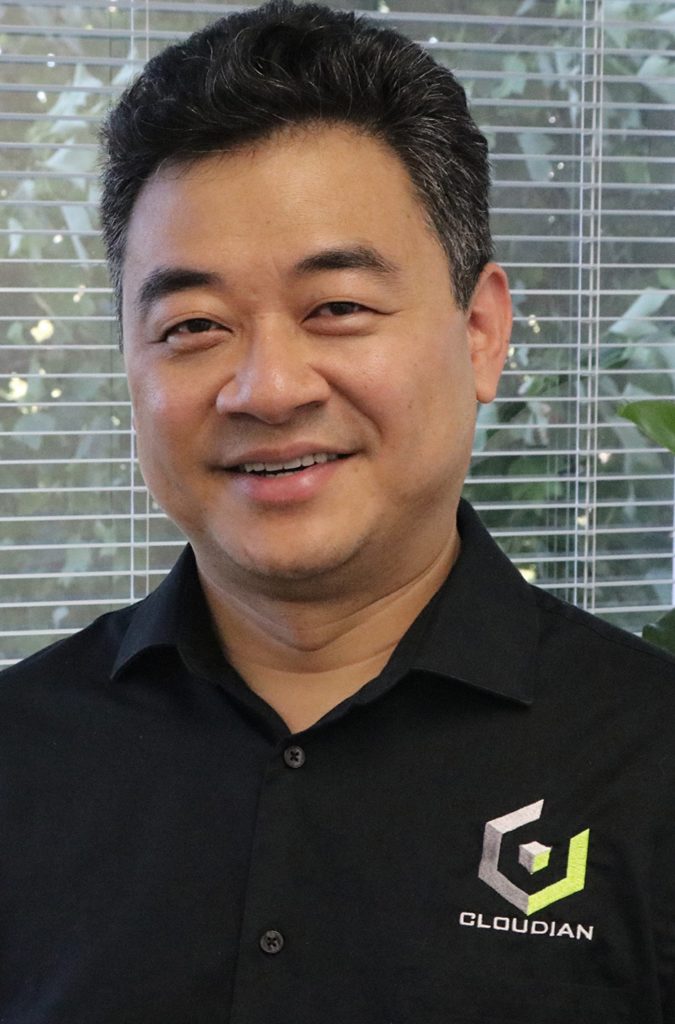Cloudian has raised $60 million in fresh funding – its first round since 2018 – and appointed its first board chairman in a bid to accelerate growth.
The company supplies HyperStore S3-compatible object storage and NAS that can run on-premises or in the public cloud with a single hybrid cloud and cloud-native management layer. It was started in 2011 by CEO Michael Tso and president Hiroshi Ohta and is one of the top three privately owned and venture-funded object storage suppliers. The other two are MinIO and Scality.
Tso said: “As organizations move to the next level of digital transformation, they increasingly seek technologies that deliver hybrid cloud data management at limitless scale across all platforms. Cloudian’s cloud-native data management software lets our customers simplify operations and creates new opportunities to derive value from data.”
The F-round takes total funding to $233 million. It had contributions from Digital Alpha, Eight Roads Ventures Japan, INCJ, Intel Capital, Japan Post Investment Corporation, Silicon Valley Bank, Tinshed Asia, Wilson Sonsini Investments, and investors like new chairman Bob Griswold.

Griswold has a strategic advisor role as part of his chairmanship. He was VP of strategy and planning at HPE, SVP product line management at Seagate, and VP and chief strategist for Enterprise, Commercial and Small Business at Cisco.
He said: “Cloudian is exceptionally well positioned to capitalize on today’s transition to cloud-native technologies, and I believe strongly in the company’s strategy and its enterprise-proven platform; so much so, that I personally invested in the current funding round.”
Cloudian sees substantial scope for growth because of the surge in unstructured data and the need to search and analyze it for information that may help organizations become more efficient or responsive to their customers and environment.
Gartner research indicates 95 percent of new workloads deployed in global business such as media, healthcare and manufacturing in 2025 will employ cloud-native technology. It says there is a rapidly growing need for multi-cloud infrastructure to provide a unified platform for these applications.
We asked Michael Tso some questions about Cloudian, the new round and his views on the market.

Blocks & Files: Why was there a need to raise money now?
Michael Tso: The new funding was raised to support our continued growth as we exit a strong quarter and look to capitalize on the opportunities we see in the coming year.
Blocks & Files: What will the new money be used for? Engineering? Go-to-market stuff? General corporate purposes?
Michael Tso: The funds will support Cloudian’s go-to-market and product development initiatives under way in data analytics, hybrid cloud, data protection, and sovereign cloud. Each of these requires investment as we develop these growing markets for cloud-native data management.
Blocks & Files: Who was the board chairman before Bob Griswold?
Michael Tso: We didn’t have an official chairman before.
Blocks & Files: Have any board members left recently?
Michael Tso: Dr C S Park became a board advisor as he is looking to retire from all his board duties.
Blocks & Files: Cloudian’s market positioning statement seems relatively unchanged – correct me if I’m wrong – so is it right that it is not pursuing a new opportunity in the market but doubling down on the existing need for enterprises to store increasing amounts of unstructured data both on-premises and in public clouds in S3 accessible form with a single management layer covering geo-distributed systems?
Michael Tso: Our core value remains the same – hybrid-cloud data management. Within that space we see market demands evolving quite rapidly. More and more, our customers are adopting cloud-native technologies enterprise-wide, and now use S3-compatible storage for unstructured data in general.
Three factors are driving this. First, data management applications increasingly support the S3 API. Vendors in data analytics, data lake house, and data protection have all gone this way. Analytics vendors are the most recent to adopt the S3 API, and Cloudian has announced relationships with Snowflake, Teradata, Microsoft SQL Server, VMware Greenplum, and Vertica.
Second, our customer’s in-house applications increasingly employ the S3 API for primary data workloads, including performance-sensitive ones such as trading floor operations. This increases the demand we see for performance features and flash-based platforms.
Third, customer expectations, now shaped by public cloud, increasingly demand efficient, easy-to-manage cloud-native technologies throughout the organization. By contrast, old-school storage silos now appear wasteful and hard to manage, inefficiencies that are harder to tolerate when you have experienced the single namespace simplicity of cloud. With Cloudian, you can put scale-out cloud technology wherever you need it, from the edge, to the core, to the cloud.
Blocks & Files: How would Cloudian differentiate itself from MinIO?
Michael Tso: Cloudian was built from the start as an enterprise-level platform, and this is what our customers are looking for. They choose Cloudian for our customer-proven scalability to hundreds of petabytes, for geo-distribution capabilities across any number of locations, for industry-leading security certifications, and for enterprise-class support with local teams worldwide. Our platform was built from the start for enterprise scale, and we have the customer references to back that up. By contrast, MinIO was launched as an open-source tool for Kubernetes developers, a legacy that remains today. It is not unusual for us to encounter a user that develops applications on MinIO then switches to Cloudian for production.
Blocks & Files: And what about Scality?
Michael Tso: Cloudian offers a full-range solution, including software and appliances, all sold and supported by the Cloudian team. We even offer a remote management program, called HyperCare, where we essentially manage the complete solution for you. Furthermore, Cloudian HyperStore is an easy-to-use solution, built on a single software image that makes it easy to deploy and to scale. Cloudian also offers the most complete set of security certifications in object storage, a distinction that has won business at US government agencies and at defense cloud providers such as milCloud 2.0. All of these differentiate Cloudian from our competitors.
Blocks & Files: How does Cloudian view the edge market? Is there scope for object storage at particular kinds of edge sites?
Michael Tso: The edge is an important market for us. Our customers know that moving data is hard. It’s costly, time consuming, and adds security risk. With Cloudian, you can put the physical storage wherever you need it and still manage the whole infrastructure as one system. Our customers have used this to deploy storage at wind tunnels, manufacturing sites, and healthcare clinics. We envision a continuum of storage resources starting from the core and moving out to any location where data is collected, yet all managed and protected within a single framework.
Blocks & Files: How does Cloudian view the need for high-performance object storage with all-flash hardware? Is this an important and growing or a relatively limited niche market?
Michael Tso: Cloudian software is media-agnostic. We have seen a growing number of our customers running Cloudian on all-flash systems to benefit from the resulting performance gains.
Several factors now drive this move to flash. One is the increasing use of object storage in performance-sensitive workloads. For example, a Cloudian customer in the credit card space is standardizing on object storage for all unstructured data, both archive and primary. Their infrastructure is all-flash. Another driver for flash will be power efficiency. As energy prices climb, the power savings of flash become increasingly compelling. We expect industry-standard servers and components will continue to drive down the total cost of ownership for flash systems and Cloudian software’s media agnostic capability enables customers to make future-proof technology decisions today.








